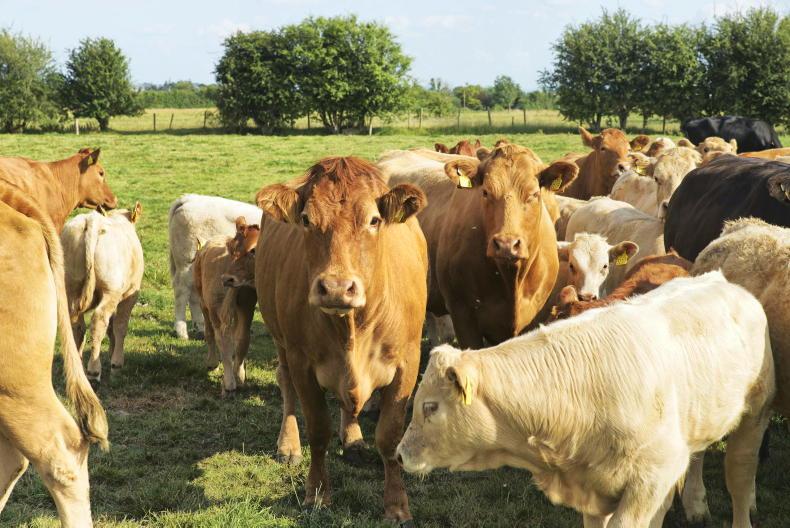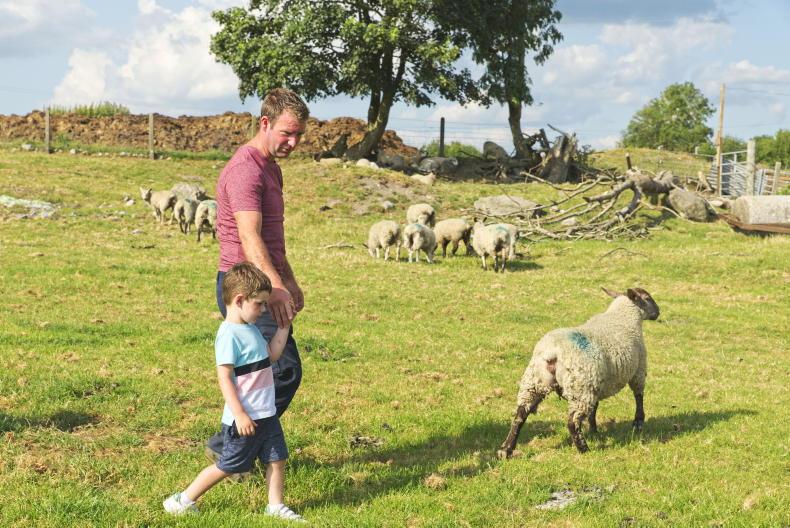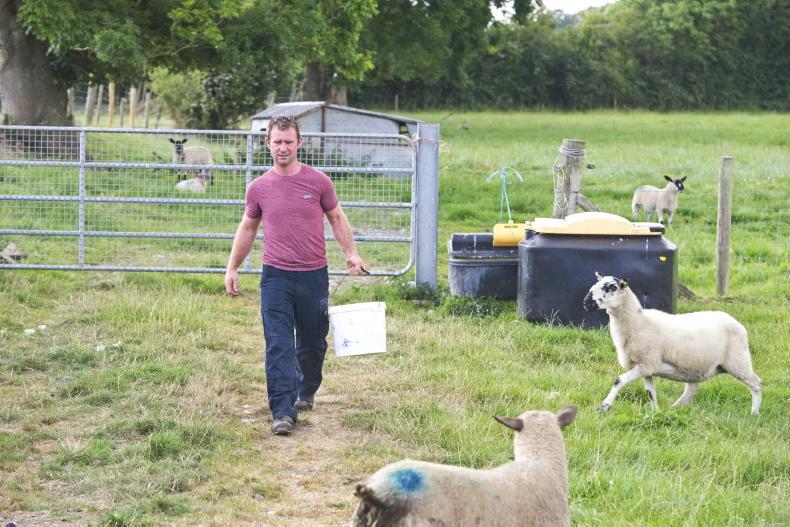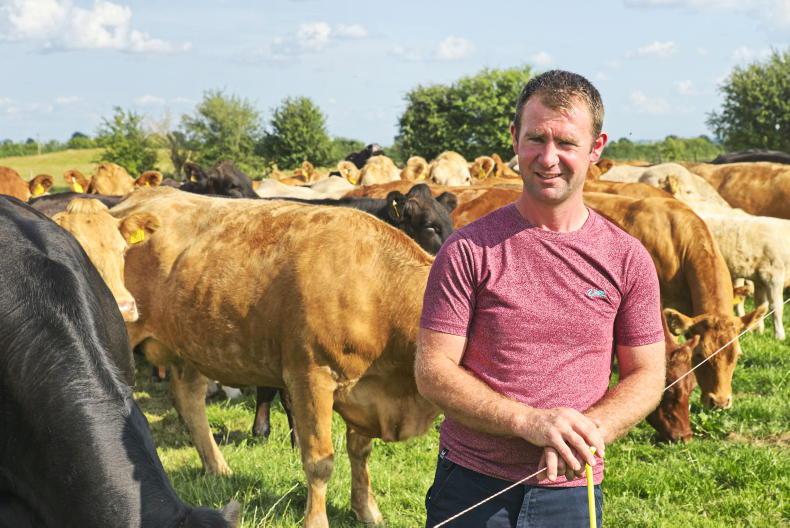Johnny Duane farms in partnership with his dad John and juggles farm work alongside off-farm employment as a part of the droving team in Portumna Mart. Like many drystock farmers in the west of Ireland, it is a necessity to keep another job alongside working the farm.
Johnny’s farm is comprised of fragmented blocks, which make up their suckler and sheep enterprises. The home farm consists of 110ac, as well as having 65ac leased to make a total of 175ac farmed by the Duanes. Johnny and his father run 75 suckler cows alongside 270 ewes and followers.
The farm is split into three blocks, which leaves a little bit more work, but the family makes the most of it.
“It works well to have cattle and sheep split into different groups. The autumn-calving herd can be kept on a separate block to the spring-calving herd, which leaves it easier for us to manage,” Johnny says.

Beef system
The farm is based near Portumna, Co Galway, which contains a mixture of heavy soils and some rocky ground. The suckler herd is run as a split calving system: “It leaves less pressure on housing facilities in the spring with ewes lambing as well.”
There are three stock bulls running with the herd, two Charolais and one Limousin. The Limousin bull is used to breed replacement heifers and the Charolais bring terminal traits for selling.
The herd breeds all its own replacements, calving in November alongside the autumn herd. Johnny says that this “allows heifers the chance to join the spring-calving herd the following year if they have any issues going back in-calf again.”
The farm sells heifers at 18 months old. After replacements are picked out for keeping, these heifers generally sell through Portumna Mart twice a year, with spring-calving heifers selling in autumn and autumn-calving heifers selling in the spring, giving the farm multiple sale points in the year.
All the bull calves are squeezed and sold as yearlings also in Portumna Mart. The bullocks go in two groups twice a year to the mart, in the same way the heifers do.
“Holding the heifers allows us to pick the best replacements from mature heifers which is easier as the heifers age and you see how they develop. Squeezing the male calves means we have no issues with bulls getting into heifers and having heifers going in-calf too young,” says John.

Sheep system
The Duanes lamb 270 females including ewe lambs every year. The foundation of the ewe type traces back to Suffolk cross, while nowadays a team of six rams is used that consists mainly of Charollais genetics as terminal sires, while Blue Leicester and Milford rams are used to breed replacements to maximise prolificacy and maternal traits.
The majority of lambs are sold factory-fit to Kildare Chilling and replacement ewe lambs are retained from the Milford and Blue Leicester rams.
The herd is practically a closed herd, with Johnny outlining that “it is so important for us to have herd health right on the farm and not buying in livestock is a big factor in this.
“We try to keep calving and lambing spells as tight as possible. We therefore cannot risk bringing in any disease problems from purchased stock.”

Hobbies
Johnny enjoys playing hurling with his local GAA club in Killimor, where he plays midfield or as a forward since he was a child. Now playing for the Killimor Junior team, Johnny loves the social side of the sport, which he says is important when farming, as it can be isolating at times.
Hurling allows him to get away from the farm a few times per week – prior to COVID-19 of course. The bonds and friendships built on the field last a lifetime, with Johnny’s most memorable moment on the pitch being when Killimore won the Galway U21 County Championship in 2006.
Another pastime that both Johnny and John enjoy together is breeding Connemara horses. One of their Connemara mares is 22 years old, and the Duanes have been successful breeding this mare in recent years, selling two foals privately to England last year. However, most sales are carried out through Clifden Mart.
“It is extremely enjoyable and takes no major work, but is very satisfying seeing foals sell successfully,” Johnny explains.
Future
Johnny outlined how he and his father work very well together in partnership: “Dad is the brains and I’m the workhorse.”
They receive help from Johnny’s partner Claire in the evenings and weekends when necessary. Johnny says he would love for his own two sons to continue their love for the farm, as they have a great interest at young age, with the oldest being five and the youngest aged two.
“They just love being out and about on the farm. They would come out with me looking at cattle or sheep all day every day.”
The family is continually trying to improve the quality of cattle they are breeding on the farm and Johnny would like to get to the point where instead of selling stores, the farm would move to selling top-quality weanlings. This would allow them to increase cow numbers, as the number stock classes on the farm at one time would be less.
Farm facts
Location:
Portumna,
Co Galway.Size: 175ac.System: suckler to store and sheep.Cows: 75.Sheep:
270 plus
followers.
Johnny Duane farms in partnership with his dad John and juggles farm work alongside off-farm employment as a part of the droving team in Portumna Mart. Like many drystock farmers in the west of Ireland, it is a necessity to keep another job alongside working the farm.
Johnny’s farm is comprised of fragmented blocks, which make up their suckler and sheep enterprises. The home farm consists of 110ac, as well as having 65ac leased to make a total of 175ac farmed by the Duanes. Johnny and his father run 75 suckler cows alongside 270 ewes and followers.
The farm is split into three blocks, which leaves a little bit more work, but the family makes the most of it.
“It works well to have cattle and sheep split into different groups. The autumn-calving herd can be kept on a separate block to the spring-calving herd, which leaves it easier for us to manage,” Johnny says.

Beef system
The farm is based near Portumna, Co Galway, which contains a mixture of heavy soils and some rocky ground. The suckler herd is run as a split calving system: “It leaves less pressure on housing facilities in the spring with ewes lambing as well.”
There are three stock bulls running with the herd, two Charolais and one Limousin. The Limousin bull is used to breed replacement heifers and the Charolais bring terminal traits for selling.
The herd breeds all its own replacements, calving in November alongside the autumn herd. Johnny says that this “allows heifers the chance to join the spring-calving herd the following year if they have any issues going back in-calf again.”
The farm sells heifers at 18 months old. After replacements are picked out for keeping, these heifers generally sell through Portumna Mart twice a year, with spring-calving heifers selling in autumn and autumn-calving heifers selling in the spring, giving the farm multiple sale points in the year.
All the bull calves are squeezed and sold as yearlings also in Portumna Mart. The bullocks go in two groups twice a year to the mart, in the same way the heifers do.
“Holding the heifers allows us to pick the best replacements from mature heifers which is easier as the heifers age and you see how they develop. Squeezing the male calves means we have no issues with bulls getting into heifers and having heifers going in-calf too young,” says John.

Sheep system
The Duanes lamb 270 females including ewe lambs every year. The foundation of the ewe type traces back to Suffolk cross, while nowadays a team of six rams is used that consists mainly of Charollais genetics as terminal sires, while Blue Leicester and Milford rams are used to breed replacements to maximise prolificacy and maternal traits.
The majority of lambs are sold factory-fit to Kildare Chilling and replacement ewe lambs are retained from the Milford and Blue Leicester rams.
The herd is practically a closed herd, with Johnny outlining that “it is so important for us to have herd health right on the farm and not buying in livestock is a big factor in this.
“We try to keep calving and lambing spells as tight as possible. We therefore cannot risk bringing in any disease problems from purchased stock.”

Hobbies
Johnny enjoys playing hurling with his local GAA club in Killimor, where he plays midfield or as a forward since he was a child. Now playing for the Killimor Junior team, Johnny loves the social side of the sport, which he says is important when farming, as it can be isolating at times.
Hurling allows him to get away from the farm a few times per week – prior to COVID-19 of course. The bonds and friendships built on the field last a lifetime, with Johnny’s most memorable moment on the pitch being when Killimore won the Galway U21 County Championship in 2006.
Another pastime that both Johnny and John enjoy together is breeding Connemara horses. One of their Connemara mares is 22 years old, and the Duanes have been successful breeding this mare in recent years, selling two foals privately to England last year. However, most sales are carried out through Clifden Mart.
“It is extremely enjoyable and takes no major work, but is very satisfying seeing foals sell successfully,” Johnny explains.
Future
Johnny outlined how he and his father work very well together in partnership: “Dad is the brains and I’m the workhorse.”
They receive help from Johnny’s partner Claire in the evenings and weekends when necessary. Johnny says he would love for his own two sons to continue their love for the farm, as they have a great interest at young age, with the oldest being five and the youngest aged two.
“They just love being out and about on the farm. They would come out with me looking at cattle or sheep all day every day.”
The family is continually trying to improve the quality of cattle they are breeding on the farm and Johnny would like to get to the point where instead of selling stores, the farm would move to selling top-quality weanlings. This would allow them to increase cow numbers, as the number stock classes on the farm at one time would be less.
Farm facts
Location:
Portumna,
Co Galway.Size: 175ac.System: suckler to store and sheep.Cows: 75.Sheep:
270 plus
followers. 









 This is a subscriber-only article
This is a subscriber-only article










SHARING OPTIONS: